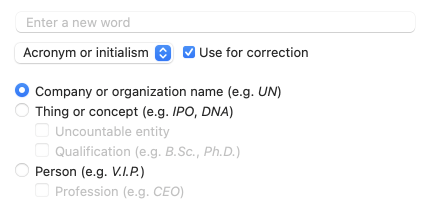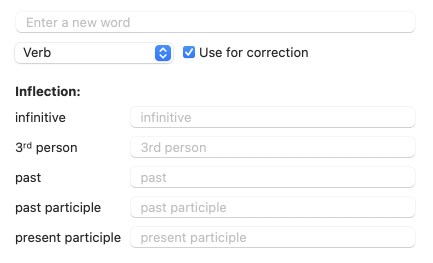Configuring an Entry in the Personal Dictionaries
When adding a word to a personal dictionary, you must provide some information about it for the corrector to be able to analyze it properly.
- Be sure to avoid duplicating words for no reason, as it can slow the corrector down. Duplicate words are indicated in the list with an alert icon .
-
 123ABC
123ABC
Headword
Enter your word in the headword field to indicate how it should be spelled. Enter its uninflected form, i.e. the singular form for a noun or the infinitive without to for a verb. Antidote automatically chooses the syntactic category that seems most appropriate for the word. Change the category as needed.
Categories menu
Choose the syntactic category of the word you are adding (noun, proper noun, adjective, verb, etc.).
Use this word for correction
When this box is unchecked, Antidote will add the new word to its dictionaries and display its definition, but it will not use the word for correction. For example, you may uncheck this box if you are simply adding a new meaning for a word that Antidote already recognizes, in order to avoid ambiguities during the correction process.
Other information
You must tell Antidote about certain semantic, syntactic or morphological properties of your word. The type of information you need to enter depends on the word’s syntactic category.
Adding a noun

Antidote asks you to specify whether your noun denotes a thing or a concept (e.g. jewel, butter, joy), a person (e.g. girl, linguist) or an animal (e.g. panther). Check the appropriate box or boxes.
If it represents a thing or a concept and is usually treated as a mass or a thing that can’t be counted (e.g. joy, water), you should also check the Uncountable entity box. If it refers to an academic degree (e.g. B.Sc., Ph.D.), check the Qualification box.
If it refers to a person and represents a professional title (e.g. linguist), check the Profession box.
- Indicate how the plural form should be spelled in the Inflection section below.
Adding an adjective

If you are adding an adjective (Australian, for example as in Australian beer) that can also be the name of a resident or native of a place (an Australian), check the Demonym box. If the word also refers to a language (Greek, for example), check the Spoken language box, as well. Otherwise, leave both boxes unchecked.
Verify that Antidote has inserted the correct comparative and superlative forms (i.e. the –er/–est suffix for one-syllable adjectives, or the word more/most for the majority of adjectives with two or more syllables).
Adding an interjection

Do not include an exclamation mark (!) if you add an interjection to a personal dictionary. Choose from three types of interjection: emotional interjection (e.g. damn), message to others (e.g. hello) or sound (e.g. ding).
Adding an adverb

When you add an adverb to a personal dictionary, you must specify whether it is an adverb of manner (e.g. politely), of time (e.g. today) or of place (e.g. everywhere). Check the appropriate box or boxes. You can check more than one box if your adverb belongs to more than one type. Leave the boxes unchecked if it does not belong to any of these three types. (To learn about all adverb types, read the Adverbs article in Antidote’s Grammar guide, under Other Categories).
Adding a proper noun

Proper nouns normally begin with a capital letter. Antidote asks you to specify whether your proper noun is a Last name, First name, Company or organization name, Brand name, Place name, Demonym (e.g. Australian), Title of a work, or Other.
If it is a place name, you will be asked whether it is a Street, Town/city, Island, County/region, Body/course of water, or Celestial body.
If it is a demonym (e.g. Australian), check the Language box if it also refers to a language (e.g. Greek).
If your proper noun does not correspond to any of these descriptions, select Other.
Adding an acronym or initialism

Antidote asks you to specify whether the acronym or initialism you are adding is a company or organization name (e.g. UN), a thing or concept (e.g. IPO, DNA) or a person (e.g. VIP). If it is a thing, you can specify whether it is uncountable (e.g. DNA) and whether it represents a type of qualification (e.g. Ph.D.). If it is a person, indicate whether it represents a professional title (e.g. CEO).
- Indicate how the plural form should be spelled in the Inflection section below.
Adding a verb

Antidote automatically infers the infinitive, 3rd person, past tense, and past and present participle forms of the verb, and inserts them into the entry form for you to edit as necessary.
Inflection
When you enter a noun, a first name, or an initialism or acronym, Antidote will ask you to confirm the suggested singular and plural forms in the Inflection section. For an adjective, Antidote will suggest comparative and superlative forms for you to approve or edit. For example, if you enter dibble as an adjective, the suggested comparative and superlative forms will be more dibble and most dibble, but you can change them to dibbler and dibblest if you prefer.
Definition
Enter a definition for your new word in the Definition section. For the adjective antidotal, for instance, you could enter “Concerning Antidote”. In fact, you can enter any information, note or comment you consider relevant to the word or its meaning. If you are writing a novel, you can enter a description for each of your characters. If you are working in sales, you can enter the terms your company uses preferentially or include technical information about the products it sells. When you come across one of these words in a future text, you can simply open the dictionaries to display its definition and view this information.
The and buttons at the bottom of the section apply bold and italic to the selected text. The button adds a link to a web page.